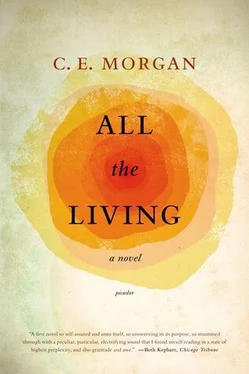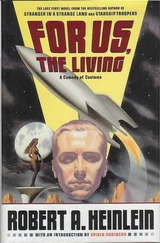It took her less than forty-five minutes to make chicken in broccoli and cheese — a small miracle, as she’d learned only a month prior that chicken could be baked in the oven like a pie and not just fried to a crisp in a skillet. She slapped two sandwiches together for Orren as he watched her balefully, his shirt unbuttoned and stripped off his upper half, but hanging still from the waistband of his jeans as though he’d raptured out of it. She spread mayonnaise and bologna on bread as the chicken baked. He leaned against the counter as she paid him no mind.
What’s that you’re making? he said.
Sandwiches for you. What’s it look like, she said without looking up.
No, that, he said, indicating with one mud-brown hand toward the oven. Kinda hot for baking, he said.
It’s for church, she said.
What, you’re fixing to go back? He looked up at the clock on the kitchen wall between the two large windows on the northern wall. It was almost two.
Yeah, she said. There’s a picnic.
God bless, he said. Ain’t they got shit to do? It’s a drought.
Well, it’s too dry to do much, isn’t it?
Hell, he said, they can spit on their plants. Or cut their wrists. She shot him a dark look when she handed him the sandwiches stacked, but he took them and began to move off without further comment. But then he said, Next time be Christian with the bologna, and he passed out of the house and in her mind’s eye he was shaking his head, though she did not glance behind her until the door slammed. Aloma stepped across the room to snatch open the door again. She watched as Orren ate the sandwiches in three bites each and walked back down toward the tobacco, struggling one arm and then the next into his shirt as he went. Aloma rested a box fan on a chair in front of the door then and sat in the breeze with her legs spread and her skirt hiked up on her thighs. The oven’s heat pressed her like a hand from behind. The only sound she heard over the fan was the occasional report of wood cuffing wood, though from what direction it was coming she was unable to tell. She counted the knocking echoes as they broke.
She drove through the sweltering late afternoon trying to remember the directions to the ballpark, but it was not so clear in her mind and she took four wrong turns that led her in a loop all the way to the other side of the county before curving back around. The chicken sat under foil on the seat beside her, barely cooling. She sweated so that the back of her shirt was wet and she sat up and hugged the wheel to feel the cool breeze as it shook her shirt. Her stomach suffered. She had not eaten anything and an emptiness hovered just under her heart, a vague discomfort at the center of her. She looked repeatedly at her watch as the hour approached and passed two-thirty and that only made the feeling worse so she breathed deep to settle herself and did that over and over until she finally turned onto the correct stretch of road and could see the ballpark with its siltdust diamond infields in the distance. But then as she was approaching the entrance to the park — and even lifting her foot off the gas to brake — and she could make out the familiar bearing of the people from the church and Bell’s figure among them, because he stood a full head over all the others, she turned her head away as though resolute on some other purpose and pressed her foot to the gas and drove straight on. She blinked, but did not turn her head to the left or the right, only lifted her left arm to rest it on the window to shield her face. She held her breath. Then she passed quickly, and once she rounded the bend at the far end of the road, she leaped the gas so that her tires spun out and left abrupt side-swiping marks on the asphalt where the road entered a line of trees. She looked at herself in her rearview and her face was wide-eyed but otherwise innocent of expression. Then she tilted the mirror toward the ceiling with her shifting hand. The foil on the chicken rattled in the wind as she sped; Orren would eat it after all. And if he asked why she brought it back, she would tell him the truth, that she had felt mysterious and ill of a sudden and could simply go no farther.
This time she took the wrong roads intentionally so that she drove the long way back to the farm. She switched the radio on, she switched it off. And as she passed out of the trees, the road rippled in the heat and she dropped her hand out the window, grabbing distractedly at woolen handfuls of air. She passed a stretch of road where the trees fell away on both sides and the mountains were just a blued thinspun haze to the east and there were open fields to the left and to the right of her. Her eyes were tired to see the tobacco sucking at the milkless soil, but there was nothing else to see, there were no houses here, not even barns. These were bigger farms than theirs, bigger than what Emma and Orren’s father had farmed. And she thought to herself suddenly, Was it just like this empty stretch of road where Emma and Cash… She realized that she did not even know where it was that they had died, only that it was not far from the farm, somewhere near the top of the county. And she thought of Orren and how he drove off in his truck at least once a day to fetch something from the grocery or all the way in Hansonville and did he pass that spot and what must he think when he saw it… She thought this all for the first time. And it occurred to her then that he was the last one, he was the distillation of what had once been the complex and dilute lifeblood of a family. He was a family cut down to one. She too was a last one, but she’d never thought of herself that way, she’d never thought of it much at all. Aloma had learned of loss only by hearing that it had once happened to her, but Orren had lived that heavy change in the undying instant when the steel rumpled like hard cloth and the sheet metal sheered off in a clean slide toward the perfect brilliant glass of the windshield. And now Orren was like a man who had not heard the thing was finished, begun but not yet ended, no final word yet from that empty road. Aloma let her foot unthinkingly off the gas so that the truck slowed and nearly stopped before she realized what she had done. She blinked. She woke to her surroundings. The dust breathed up off the soil on the sides of the road and whispered out onto the blacktop, swirling into tiny eddies which the wind moved, but barely. She spied a tree that had begun to turn early in defeat. Her eyes were wide to the miscarriage of the summer, the ruth and pity of it. She suddenly desired the betterment of everything, for herself and Orren and every single thing that had ever died, or would. And for a moment, just this once, she wanted to be at the house. She pushed her truck too hard into third and the engine labored as she pressed her foot unforgivingly to the gas and drove home as if she could not get there fast enough, as if there it would not be dry.
The week passed and Aloma grew so wearied from waiting, she felt no relief at all when the first black cloud engulfed the northwestern horizon. She did not even notice it at first, standing as she was over the stove, her back to the world and her head down. She did not feel the air charge, abrading against itself, and did not know the winds rose up in a quarrel with the stillness. She started only when she heard Orren’s voice behind her. He appeared suddenly, balanced on the threshold, gripping the old wood and leaning back, silhouetted by the bright blue stormless sky.
Aloma, he said. She wiped her hands on the sides of her blouse and followed him when he jumped off the concrete steps and disappeared around the side of the house. She found him standing on the lawn with his eyes cast up and the crown of his head tilted back. She reached out to touch the worn walls to steady herself, beyond him she saw the skeining clouds that took the horizon, the great massing bulk of the storm that had grown in silence for the better part of an hour.
Читать дальше
Конец ознакомительного отрывка
Купить книгу











